No changes here. Two years of Donald Tusk’s rule.

On October 15, 2023, driven by hope for change, we decided in record-breaking elections that power would go to a coalition of pro-democratic parties. We were given very specific promises: combating hate speech, civil partnerships, overhauling the judicial system, and liberalizing abortion law. Among the urgent issues to be addressed by decision-makers is a dignity-based gender recognition procedure. After two years in power, we can confidently say: no changes for us. Let’s take a look at what has happened over the past two years on key issues for the LGBT+ community.
Civil partnerships
In the case of civil partnerships, after nearly two years of discussions, negotiations, record-breaking public consultations, and widespread public support, the government failed to adopt the bill, the Sejm is not working on it, and in recent weeks we have a bill-proposal that provides even less protection for partnerships than the government’s already compromised bill.
According to the latest poll conducted by Opinia24, 54% of respondents support the introduction of civil partnerships in Poland.
Protection against hate speech and hate crimes
This is the only proposal included in the coalition agreement. The initial stages of work on amending the Penal Code were very promising. The amendment proposed expanding code protection based on age, gender, disability, sexual orientation, and gender identity. During the process, gender identity was deleted and protection was limited solely to individuals who actually possessed a given characteristic. However, thanks to the hard work of social organizations, a successful draft was developed, which was voted on by the Sejm and Senate. Andrzej Duda referred the draft to the Constitutional Tribunal, which ruled the amendment unconstitutional. In short, nothing has changed regarding protection against hate speech against LGBT+ people.
Gender recognition
Although this demand did not appear explicitly in their election platforms, organizations have been raising the need for years to change the way gender recognition is handled in Poland. The then-Minister of Justice, Adam Bodnar, issued a regulation that gave gender recognition cases a high priority. Furthermore, the practice introduced by Zbigniew Ziobro of requiring the mandatory participation of prosecutors in gender recognition cases was ended.
The Supreme Court’s ruling reversed nearly 30 years of established case law and relegated gender recognition cases to non-litigious proceedings. At the same time, it obligated the legislature to introduce a comprehensive statutory solution. All indications are that the government and parliament will not address this issue during this term.
Has anything changed for the better?
The narrative towards LGBT+ people has certainly changed. This is evident in the example of public media, which has moved away from language of contempt and hatred towards our community. Adam Bodnar’s apology, as Minister of Justice, was symbolic. He apologized to LGBT+ people for years of systemic violence and discrimination by the state. We are also seeing a shift in politicians’ approach to equality issues.
A noticeable change is the emergence of partners on the other side with whom we can talk.
It’s a shame that this is still a layer of declarations, not real change.
Tags
Also check
Last added
-
23.12.2025
Thank you for another year we shared together!
-
19.12.2025
The “Pride & Parent – Rainbow Parenthood in Poland” e-book is now available!
-
01.12.2025
Another edition of Pride & Parent workshops is behind us, online workshops coming soon!
-
25.11.2025
Groundbreaking CJEU ruling: Failure to transcribe a foreign same-sex marriage certificate is incompatible with EU law
-
25.11.2025
The final day to apply for the “Building Equality Together” grant programme!
KPH Newsletter
Subscribe to our newsletter and we will make sure you receive information about the actions undertaken by our organization.

 Profile on Facebook. Page opens in new window.
Profile on Facebook. Page opens in new window. Profile on Twitter. Page opens in new window.
Profile on Twitter. Page opens in new window. Profile on Linkedin. Page opens in new window.
Profile on Linkedin. Page opens in new window. Profile on Youtube. Page opens in new window.
Profile on Youtube. Page opens in new window. Profile on Instagram. Page opens in new window.
Profile on Instagram. Page opens in new window. Profile on TikTok. Page opens in new window.
Profile on TikTok. Page opens in new window.